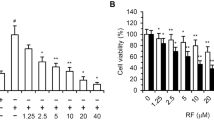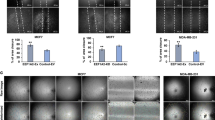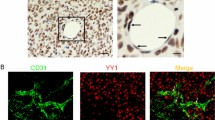Abstract
Gene therapy with the tumor suppressor gene p53 induces cancer cell apoptosis in vitro and in vivo and inhibits tumor growth in nude mice. We hypothesized that, in addition to cancer cell apoptosis, a replication-deficient adenovirus vector which carries the cDNA for human wild-type p53 (AdCMV.p53) may also modulate endothelial cell function and inhibit angiogenesis. Human umbilical vein endothelial cells (HUVEC) were infected at different multiplicities of infection (MOI) with either AdCMV.p53, the control vector AdCMV.null or were not infected. Western blot analysis showed p53 overexpression up to 7 days after infection with AdCMV.p53. HUVEC proliferation was either not affected (20 and 50 MOI) or inhibited to comparable levels (100 MOI; P < 0.05) in adcmv.p53- and adcmv.null-infected versus uninfected cells. huvec differentiation into capillary-like structures on reconstituted basement membrane proteins (matrigel) was assessed 48 h after infection (100 moi). after 18 h on matrigel the capillary-like network formed by adcmv.p53-infected huvec was less extensive than that formed by both adcmv.null-infected and uninfected control cells (P < 0.05 versus either control). in contrast, conditioned medium from adcmv.p53-infected huvec did not modulate endothelial cell differentiation on matrigel. the effect of adcmv.p53 on angiogenesis in vivo was assessed by injecting this vector subcutaneously in mice; 3 days later matrigel containing basic fibroblast growth factor (bfgf) was injected at the same site. in other experiments adcmv.p53 was injected simultaneously with an ad vector coding for vascular endothelial growth factor (adcmv.vegf165) into the rat perirenal fat tissue. AdCMV.p53 significantly inhibited neovascularization induced by bFGF within the Matrigel plugs (P < 0.05) or by adcmv.vegf165 in the fat tissue (P < 0.05). thus, the anti-angiogenic effect of ad-mediated wild-type p53 overexpression may contribute to the ability of this viral vector to inhibit tumor growth.
This is a preview of subscription content, access via your institution
Access options
Subscribe to this journal
Receive 12 print issues and online access
$259.00 per year
only $21.58 per issue
Buy this article
- Purchase on Springer Link
- Instant access to full article PDF
Prices may be subject to local taxes which are calculated during checkout
Similar content being viewed by others
Author information
Authors and Affiliations
Rights and permissions
About this article
Cite this article
Riccioni, T., Cirielli, C., Wang, X. et al. Adenovirus-mediated wild-type p53 overexpression inhibits endothelial cell differentiation in vitro and angiogenesis in vivo. Gene Ther 5, 747–754 (1998). https://doi.org/10.1038/sj.gt.3300681
Received:
Accepted:
Published:
Issue Date:
DOI: https://doi.org/10.1038/sj.gt.3300681
Keywords
This article is cited by
-
Trans-arterial p53-Gene-Embolization with Gelatin Sponge Microparticles for Hepatocellular Carcinoma with BCLC Stage B: Single-Center Experience
Cell Biochemistry and Biophysics (2015)
-
Adenovirus-mediated p53 tumor suppressor gene therapy of osteosarcoma
Laboratory Investigation (2006)
-
Regulation of TGFβ1-mediated growth inhibition and apoptosis by RUNX2 isoforms in endothelial cells
Oncogene (2004)
-
Cell cycle arrest is sufficient for p53-mediated tumor regression
Gene Therapy (2001)
-
Wild-type p53 gene transfer inhibits neointima formation in human saphenous vein by modulation of smooth muscle cell migration and induction of apoptosis
Gene Therapy (2001)



